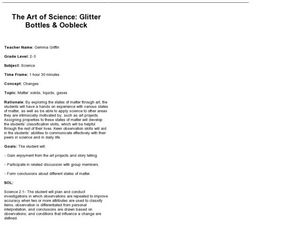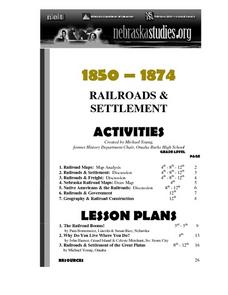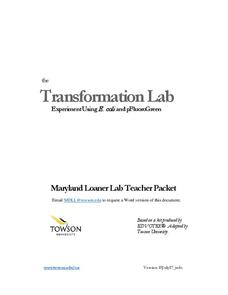Messenger Education
Mission: Possible—How Can We Plan an Exploration of Another World?
An astronaut's spacesuit weighs 280 pounds and takes 45 minutes to put on — that's a serious suit! The second activity of a three-part series allows pupils to see all that goes into space exploration. Through simulations, groups analyze...
Serendip
Carbohydrate Consumption, Athletic Performance and Health – Using Science Process Skills to Understand the Evidence
Should athletes carb load before an event or consume carbohydrates during the competition? Scholars discuss how to set up a hypothesis and experiment to answer a question relating carbohydrates and athletic performance. Then, they read...
Curated OER
Call It a Hunch
Give young scholars a chance to practice making inferences after reading the book Through My Eyes by Ruby Bridges. They confirm whether or not their conclusions are true, have a class discussion, and then independently complete an...
Curated OER
The Art of Science: Glitter Bottles and Oobleck
After having a class discussion on the three states of matter, young scientists utilize the wonderful substance, Oobleck in order to experience something that changes states of matter. They also create "sparkle jars" which...
Film English
Real Beauty
Consider the theme of beauty with discussion about what makes person beautiful and the well-known short film put together by Dove skin care. Class members examine some of the images from the film and discuss the message of the film as...
EngageNY
Grade 9 ELA Module 1: Unit 3, Lesson 17
Romeo and Juliet, Act 5, Scene 3, lines 139-170, is the focus of this day's lesson plan. Readers examine the dramatic irony in Juliet's comments and consider how "lamentable chance" caused by a "greater power" plays a role in the tragedy.
Childnet International
Cyberbullying Drama
Target, bystander, or bully? Class groups watch a short student-produced video about cyberbullying and then devise and script their own drama to encourage discussion about this hot button topic.
Channel Islands Film
Island Rotation: Lesson Plan 2
Why are Torrey pines only found in La Jolla, California and on Santa Rosa Island? Class members examine images of Torrey pines from these two locations, noting the similarities and differences, and then develop a demonstration model that...
Population Connection
Meeting Human Needs
How to meet the needs of people around the globe—a question many ask. The fifth in a six-part series about human population and its effects on the globe, the eye-opening lesson includes discussion, a homework activity, and an in-class...
Curated OER
The Railroads and Settlement of the Great Plains
Enhance your American literature unit with this resource, in which readers access the Nebraska Studies website and read about "Railroads and Settlement." They search for a photograph of some aspect of the railroad from the Prairie...
Curated OER
What Makes the Writer Write
Your 11th and 12th graders are ready to critique society! Channel that inclination by studying a novel that offers social criticism of other eras (book recommendations included). This resource presents a well-thought-out overview of such...
EngageNY
Pitching Your Claim with Best Evidence
Does Bud use his rules to survive or thrive? That is the driving question of a lesson plan following the reading of Bud, Not Buddy by Christopher Paul Curtis. In an argument essay prewriting activity, pupils use textual evidence to...
NASA
Cosmic Microwave Background
Begin your next class with a BANG! Pupils discuss the formation of our universe and its expansion before proceeding with an activity designed to demonstrate what most likely occurred billions of years ago. They conclude with a discussion...
PHET
Earth’s Magnetic Field from Space
Feel the pull of science! The final installment of this 18-part series is an application of everything learned in the previous high school lessons. Scholars are given a magnetic field map and must propose an arrangement of magnets that...
Missouri Department of Elementary
Respect: Looks Like, Sounds Like, Feels Like
Respect is the focus of a lesson designed to encourage social awareness. Following a whole-class discussion, scholars list what they believe respect looks, sounds, and feels. Pupils turn their new-found knowledge into a plan of action....
Curated OER
Newcomers
Explore emotions associated with moving to a new home with young learners. First they listen to the books Painted Words/Spoken Memories by Aliki and Going Home by Eve Bunting. Then they are invited to share their experiences as well as...
Curated OER
Novel Study: The End of the Line
The End of the Line, Angela Cerrito's gripping novel about an adolescent murderer incarcerated in an unusual "school," is the subject of a comprehensive set of support materials. Chapter vocabulary and discussion questions are excerpted...
Visa
Keeping Score: Why Credit Matters
How does one get credit, and who provides credit? What is a credit score, and how can an understanding of a credit score help you to make smart financial decisions? Through discussion and worksheets, class members will identify the...
EngageNY
Grade 9 ELA Module 1: Unit 3, Lesson 5
Class members continue their study of Romeo and Juliet by watching scenes from Baz Luhrmann’s Romeo + Juliet and then examining the figurative language Shakespeare uses in Act 1, scene 5, lines 92–109 when Romeo and Juliet meet at the ball.
EngageNY
Grade 9 ELA Module 1: Unit 3, Lesson 7
How does Shakespeare use dialogue to develop the idea that the star-crossed lovers are more concerned with their relationship as individuals than they are with their roles as children of warring families? That is the question facing...
Towson University
Transformation Lab
Transform your class' understanding of genes and antibiotic resistance with the Transformation Lab. Junior geneticists create and observe their own resistant strains of E. coli through research, discussion, and experimentation. The...
Orlando Shakes
The Taming of the Shrew: Study Guide
William Shakespeare's The Taming of the Shrew combines three things that are sure to capture scholars' attention: love, deception, and clown attire. With the curriculum guide, learners hone their opinion-writing skills and practice...
Teach With Movies
Title: "Pygmalion" - Topics: Drama/England; World/England
“What do you mean that my language is improper?” Prior to My Fair Lady was Pygmalion. Fair Eliza’s struggles with English, which according to George Bernard Shaw “is not accessible even to Englishmen,” come alive in the 1938 film version...
Curated OER
Pride and Prejudice: Darcy's Proposal to Elizabeth
Why did Elizabeth refuse Darcy’s first proposal? Was it pride or prejudice? Readers of Austin’s classic struggle with the significance of Darcy’s proposal and Elizabeth’s refusal by crafting personal response journals and sharing these...

























